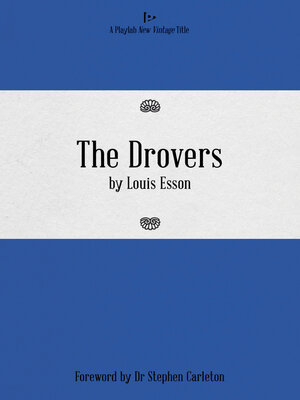
Sign up to save your library
With an OverDrive account, you can save your favorite libraries for at-a-glance information about availability. Find out more about OverDrive accounts.
Find this title in Libby, the library reading app by OverDrive.



Search for a digital library with this title
Title found at these libraries:
| Library Name | Distance |
|---|---|
| Loading... |
Life in the bush is hot, hard and not for the faint-hearted. Under the extreme sun of Northern frontier country a pack of itinerant drovers thrive in the land they call home. A freak stampede brings 'Briglow' Bill and his mates face to face with mortality and their masculinity and mateship are tested. All the while, Pidgeon, a young Aboriginal boy, watches the white fellows. He sees something the drovers cannot speak of and, for Briglow, this silence is as stifling yet as familiar and as comforting as the heat that surrounds them all.
The Drovers is a bush drama that is rich with tension, grim stoicism and heightened masculinity of the, notably, all-male characters. Clipped sentences and straight-talking speak of the no-nonsense attitude necessary to survive in the remote bush of the 1920s. The play draws us to the campfire where, in light and heat, we see the relationships the drovers experience: between each other, between white man and Aboriginal man, between man and land and, finally, the ultimate and unavoidable relationship: a man's connection with life and death.
This play reinvented the Bush drama and gave a far more authentic (if fatalistic) voice to the Far North Frontier. Louis Esson was a politically charged playwright and eminent figure within Australian theatre. He was born in Edinburgh but moved to Melbourne at a young age. Inspired by the Ireland's Abbey project of national theatre, he pioneered a new and more complex genre of Bush dramas rooted in his desire to forge a social-political forum in Australian theatre. This was augmented by the Pioneer Players, a theatre company he co-founded with Katherine Susannah Prichard and Vance Palmer. The Drovers is his most famous play, and with good reason. It was a total departure from the established hyperbolic melodramatic bush drama in its setting, themes and character portrayals. The play is a maxed-out masculine work, without any trace of women or feminine symbols (no homesteads here). This is present in every layer: it's grim tone, the setting of the camp exposed to the elements, the harsh language, and stoicism present within the characters. His portrayal of Aboriginal characters is far more complex and less minstrel-like than was common at the time. He blurs the dividing lines between racial and cultural hegemonies and symbolically recognises the connection Aboriginal people have with the land, layered with the knowledge that they have no legal claim to it at the time.







